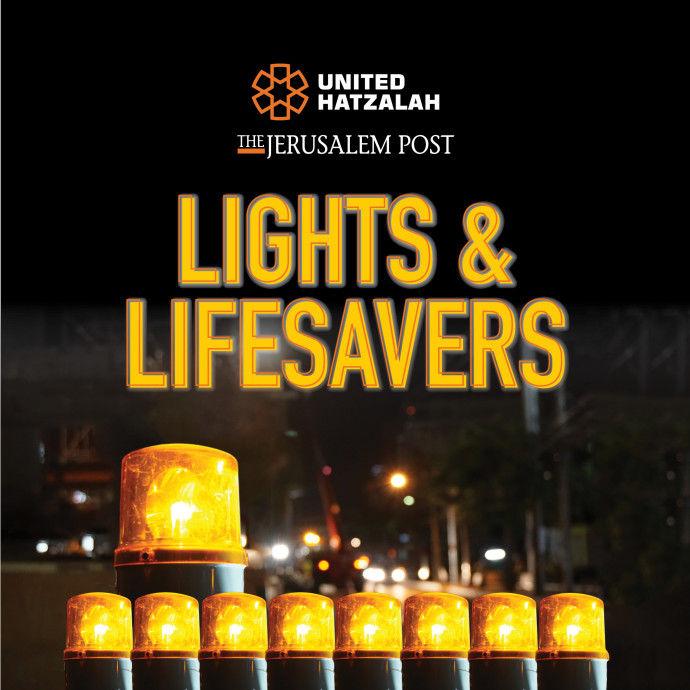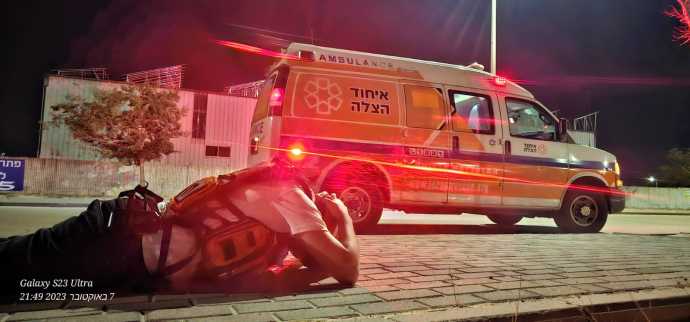Nineteen-year-year-old Yonatan Rachamim, a student at the hesder (pre-military) yeshiva in Kiryat Gat and a volunteer medic for United Hatzalah, was jolted awake in the early morning hours of October 7 by sirens.
At 7:30, as waves of missiles continued in the direction of the city, the school’s rosh yeshiva (head of the yeshiva), whose own son had been called into the army that Shabbat morning, advised Rachamim to check his phone and find out if he was needed.

Rachamim scanned the local Hatzalah channel on his phone, which reported that war had broken out, and advised Hatzalah members to go to the local volunteer headquarters to get their helmets and protective vests. Rachamim went to the center, picked up his gear, and when another siren began to sound, dashed into a bomb shelter.
“There was a direct hit on Kiryat Gat,” he recalls. “I didn’t think twice, and I ran to the location where the rocket had landed. “An 80-year-old man emerged from the building covered with soot, suffering from shrapnel wounds. An ambulance from Hatzalah arrived. The driver said, ‘I am taking him to Barzilai Medical Center in Ashkelon. Do you want to come with me?’”
Rachamim jumped into the ambulance and, together with another paramedic in the ambulance, treated the injured man as they headed towards the hospital. The young medic was stunned by what he saw when they arrived.

“I had never seen anything like this in my life,” he said. “When we reached the hospital entrance, there were beds outside the building. Military vehicles were arriving, unloading wounded soldiers and civilians to doctors waiting outside. It was a catastrophic situation.”
After bringing the injured man to Barzilai, the United Hatzalah dispatcher requested that the ambulance go to Tzomet (intersection) Netiv Ha’asara, a twenty-minute drive, to treat and transport two wounded people to the hospital.
“When we got there, we found one man who had been shot in the leg and another man who had been shot in the thigh. The first man told us that his daughter-in-law and his wife had been murdered.” They transported the two men back to Barzilai and again witnessed the crush of cars bringing the wounded to the hospital.
Next, they made their way to the settlement of Yoshivya, located near Netivot, to pick up urgently needed medical equipment for ambulances waiting at Tzomet Heletz. After dropping off the equipment, their next stop was Ofakim, where a station had been set up to treat the survivors of the Rei’im music festival massacre that morning. “We took eight of the wounded to Soroka, and along the way, they told us what had happened there,” he said.
Rachamim and the ambulance driver returned to Tzomet Heletz, where they treated more wounded, before continuing to Kfar Aza. He recalls that the roads to the Gaza settlements were littered with dozens of bodies.
“When we got to Kfar Aza, they had brought out all of the survivors, and I treated a girl and her father who had hidden in their safe room for fourteen hours. The girl was suffering from shortness of breath, and the father was in shock,” he says.
Rachamim and the driver took them to Soroka; he is still in touch with them more than two months after the event. Recalling the tumultuous events of the day, he says simply, “It was a difficult fifteen hours.”
The young life-saving medic took a first aid course in 12th grade when he was 18, and was able to apply the lessons that he had learned in his training. “In the heat of the moment, stay calm, perform your duties, and don’t worry about terrorists or other dangers.”
The Jerusalem Post is proud to partner with United Hatzalah on the Lights and Lifesavers project to honor the October 7 massacre heroes of Hanukkah. To support the country’s first responders, visit www.jpost.com/lifesavers2023.

